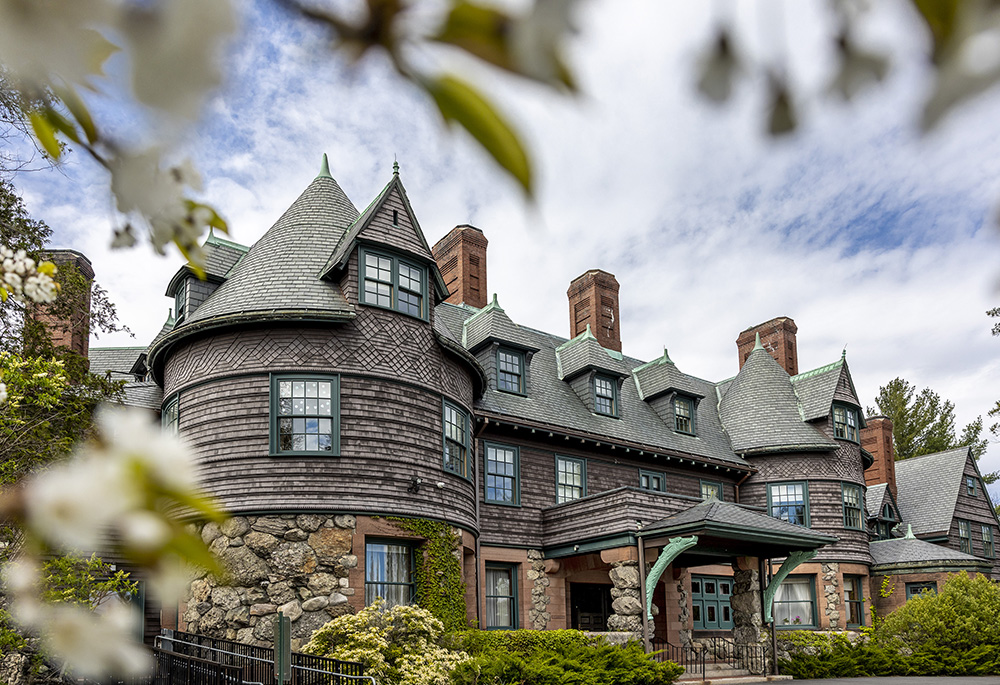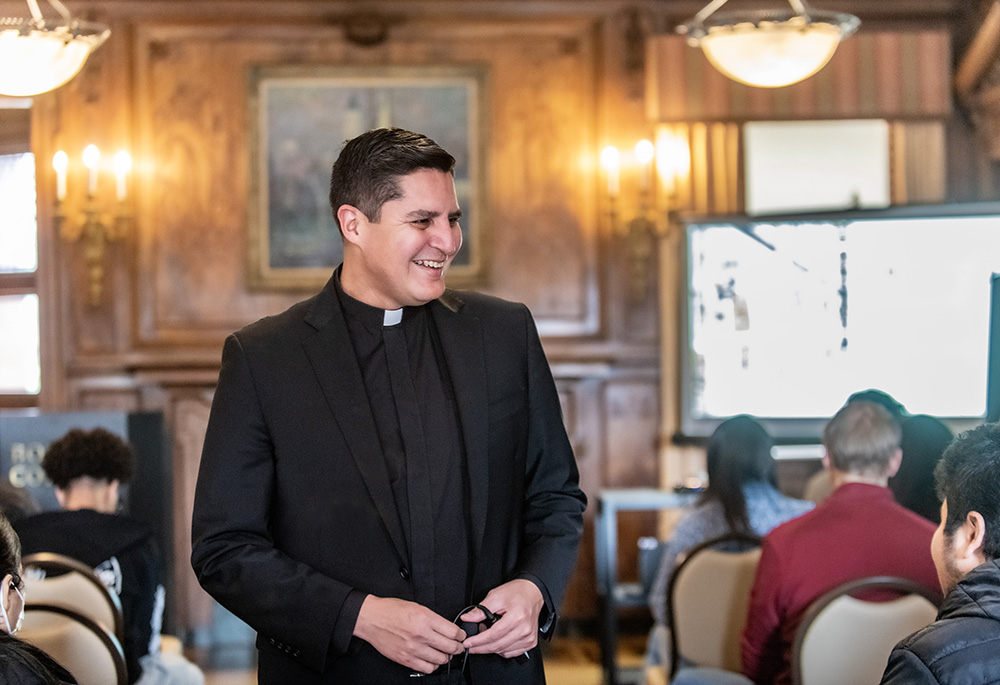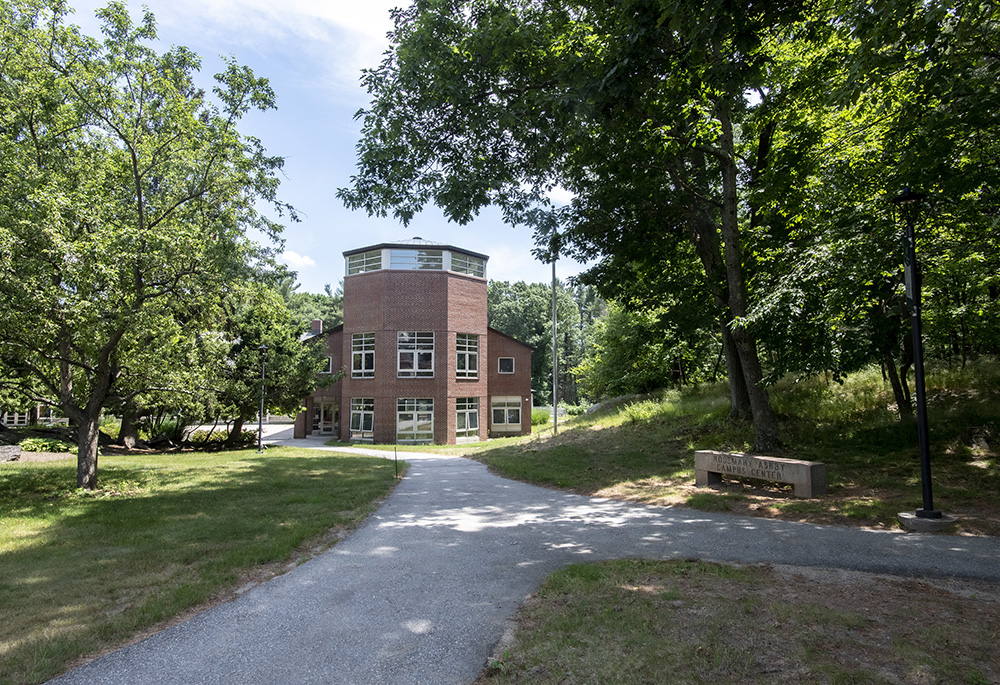
The Messina College campus, located on the Brookline Campus of Boston College (Courtesy of Messina College/Boston College)
Messina College, a new two-year, associate's degree granting program of Boston College, will be opening this July for its first class of students. It is designed for first-generation, low-income students to be able to earn a degree in a supportive environment. At the end of their two years, students who have maintained a 3.4 GPA will be able to enter the regular Boston College undergraduate program. They hope to have an entering class of 100 students.
The college will be located on the former campus of Pine Manor College, which is located a mile-and-a-half from Boston College's main campus at Chestnut Hill. This will be one thing that makes Messina stand out from other programs similar to it: providing a fully residential experience. Students will take one class on the main campus each semester of their second year, but otherwise their classes will all be at Messina.
"I tell people that the founding of Messina College brings us back to our roots as an institution," said Jesuit Fr. Erick Berrelleza, the new college's dean. Boston College was initially founded to serve the children of Boston's poor Catholic immigrants, and Berrelleza worked with schools in some of the most disadvantaged communities in Massachusetts and Rhode Island to recruit students. While not all incoming students are local, the majority of them are, the school says.
This also reflects the legacy of Pine Manor College, which closed in 2020 after the initial phase of the COVID-19 pandemic, but which had primarily served low-income and first-generation students. Continuing that practice was part of their agreement when they merged themselves into Boston College.

Jesuit Fr. Erick Berrelleza, dean of Messina College (Courtesy of Messina College/Boston College)
Messina College is committed to generous financial aid, which officials say is notable in a year when there have been significant delays with the federal financial aid form. Berrelleza said there have been students who have chosen Messina when they have had acceptances at four-year colleges that did not offer as large an aid package. Because of Boston College's desire to build a residential cohort, only students who have just graduated high school will be admitted, meaning no deferred admissions or gap years.
Antonio Serrato-Capuchina, a geneticist, will be one of the new faculty members. "I wanted to work with communities that need uplifting," he said.
"There's a difference between saying things and doing it," Serrato-Capuchina added, saying that he is pleased to become part of a community of educators who have, like him, spent their careers working with disadvantaged students. He previously worked at Project Uplift, a summer program to introduce rising high school seniors to the university experience, while studying at the University of North Carolina at Chapel Hill, and has done other educational outreach work to expose young people to science.
His goal will be to get students used to synthesizing information, not merely repeating it, and get them to see how to deconstruct a complex idea. He currently teaches advanced courses as a lecturer at Boston University, but is excited to be able to introduce the scientific method in introductory courses to students who may have never encountered it before.

The Messina College campus, located on the Brookline Campus of Boston College (Courtesy of Messina College/Boston College)
But a key part of Messina College's vision is to acknowledge and support students outside of the classroom.
As an immigrant and first-generation college (and high school) graduate himself, Serrato-Capuchina said he knows the barriers students can face in academia. "I want to build students' confidence," he said. Berrelleza said that they plan to have a heavy focus on mentorship and said that the goal is to be "helping [students] navigate this transition to college and navigate the college experience and to be successful in that — it's not always a question of academic success."
Serrato-Capuchina said that sometimes students can "feel insufficient to even apply" to jobs or internships, and that he hopes he can help them overcome that — as well as being able to connect students with the many opportunities in science that can be found in the Boston area. Students will be expected to complete an internship or clinical rotation in their second year, with the intention that if they do not wish to continue to the four-year undergraduate program, they will be prepared to enter the workforce.
Advertisement
Four associates degrees will be offered, in applied data science, applied psychology and human development, general business, and health sciences. Students will also complete a core curriculum aligned with the general Boston College requirements, to facilitate an easy transfer process to the main campus, if desired. This includes English, mathematics, social and natural science, history, and art — as well as philosophy and theology. The theology course will have a service learning component.
"Faith is absolutely implicated in what we're up to here," said Berrelleza. He added that "faith lives not only through our campus ministry, but also through our mission and ministry offices, and our first year experience office," seeing everything as working together to promote and inculcate the same values.
There will be a chapel and an active campus ministry presence, including a live-in campus minister. "The Jesuit action focus on education, that to me was a benefit," said Serrato-Capuchina.
"There's a lot of buy-in, and a lot of excitement that Boston College is working so intentionally," said Berrelleza about the faculty response to the program. He wants to ensure Messina College provides the same level of academic quality as students receive elsewhere at the university, and the faculty have been the determiners of what courses will be part of the core curriculum.
*Correction: This article was amended after initial publication to correct a factual error about another Catholic educational institution.







